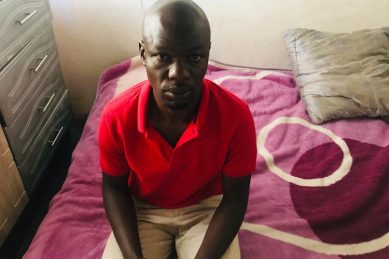Fadzi Manono fears he will never be able to bury his younger brother Witness, whose body lies deep inside a dangerous old mine in Witbank, Mpumalanga.
Witness Manono, who was an informal gold miner, was reported dead in April. He was 30 years old. Another miner told Fadzi Manono that his brother had collapsed underground in the old mine due to lack of air. The other miner had been trying to help Witness when he fell down and took his last breath.
Manono hoped the man who had helped his brother would help him get Witness’s body out. But he too died underground, according to other miners, electrocuted inside the mine.
The mine has been closed for years but Witness and the other miners found ways in.
Now Manono and his family have almost lost hope of ever retrieving the body. Security has been tightened up after the deaths of several informal miners and it is hard to get past the guards.
“Whenever I think of my brother tears roll down my cheeks, l can barely sleep at night,” says Manono, who is also an informal gold miner, working in Benoni. “All we want is to bury my brother with dignity.” Family members in the brothers’ home town of Chipinge, Zimbabwe, have been waiting for news of when the body will be brought home for burial.
Manono has been back to Witbank several times but has not been able to get in touch with other miners who were with his brother inside the mine.
“Normally other miners pull the bodies out and attach a name tag with family members’ phone numbers for mine security to find. The miner who was electrocuted had promised to help do it. But l have lost contact with the others miners who were with my brother. No one knows if they are still alive.”
Fadzi says last year a miner died inside the Benoni mine where he works. They pulled the body out with a rope and attached a name tag with the relative’s number. The family was later called by police to claim the body. The bones of many other dead miners remain unclaimed underground, he says.
He last saw Witness in 2015 when he left Benoni to seek gold in Witbank. Since then they had communicated occasionally by phone.
Manono says his brother and the other miners would live and sleep inside the mine, some for months. Using the electricity supply from an old mine building, they would connect gold refining machinery inside the mine. They would rely on the dealers to whom they sold the gold to bring them food. But sometimes security guards would confiscate the food and chase the dealers out of the area. Manono says miners would sometimes go for months without adequate food and it was difficult to cook because of the danger of gas explosions underground.
Manono says he had tried to persuade Witness to come to Benoni where, he says, the mines are safer.
“He refused to return until he had reached his target. His aim was to build a house at our rural home in Chipinge.”
Witness had become an informal miner in 2008, first mining diamonds in Chiyadzwa, Zimbabwe. He came to South Africa in 2011 and settled in Benoni to try his luck at gold mining. Later his brother, who had been working as a painter in Johannesburg, joined him.
“In 2013 Witness heard that there was lots of gold to be found in Witbank, and he decided to go there. Things went well in 2014 and my brother bought a lot of things.”
Manono says Witness had promised that once he had reached his savings target he would quit mining.
“Little did I know that he would never return.”
Source: citizen.co.za
.png)




